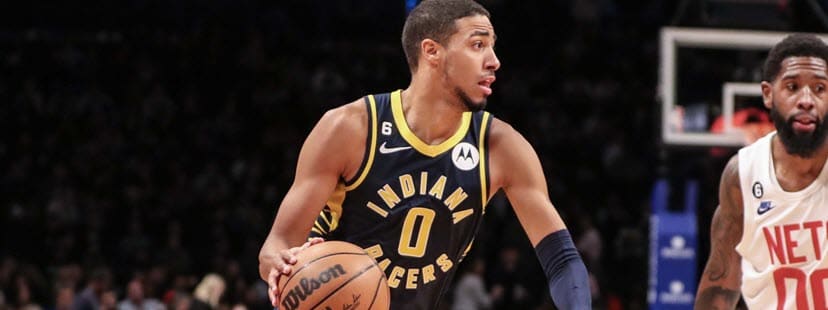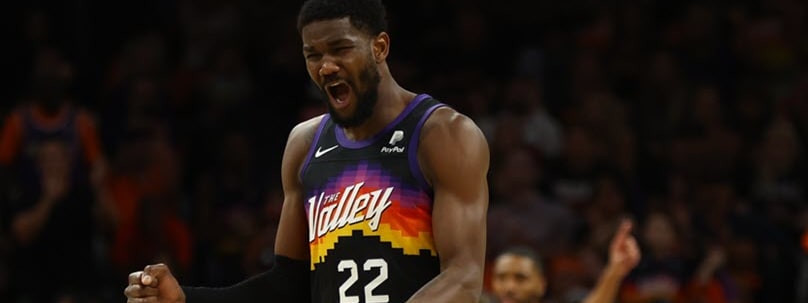Recent RotoWire Articles Featuring James Johnson
See More
Johnson saw a minimal role with the Pelicans and Mavericks during the 2020-21 season, as he averaged 7.2 points, 3.5 rebounds, 1.9 assists, 0.8 blocks and 0.8 steals in 20.5 minutes. The 34-year-old made 44.6 percent from the field and 59.2 percent from the free-throw line last season. During free agency before the 2021-22 season, Johnson agreed on a one-year contract to join the Nets and he will now fill a depth role for the team. The forward could see minutes off the bench behind Kevin Durant and Blake Griffin, but he likely won't receive the same 20.5 minutes that he received during the 2020-21 campaign. Johnson's defensive intensity could end up being crucial for the Nets, who lacked strong defenders last season. Overall, Johnson's decision to join a contender could limit his production and cause his fantasy value to drop.
Johnson started the season with Miami, where he logged just 15.6 minutes per contest in a limited role off the bench. He was traded to Minnesota mid-season and saw his role increase dramatically. In 14 contests with the Timberwolves, the veteran forward averaged 12.0 points, 4.7 boards, 3.8 assists, 2.8 combined blocks/steals and 1.2 threes across 24.1 minutes. Those numbers provided fantasy managers some quality starts, and Johnson was a great add off the waiver wire after he arrived in Minnesota. However, Johnson could be back in for a reduced role this season. He was traded to the Mavericks, who already have a plethora of options at forward, including Kristaps Porzingis, Maxi Kleber and Dorian Finney-Smith. As a result, Johnson can be ignored in the vast majority of fantasy formats.
After finishing with a double-digit scoring average in his first two years with the Heat, Johnson's production dipped considerably across 55 games this past season. Those first two years in Miami are the only campaigns in Johnson's 10-year career that he has averaged more than 9.1 points per game. Moreover, after averaging 27.4 and 26.6 minutes in 2016-17 and 2017-18, respectively, Johnson earned just 21.2 minutes per night in 2018-19. The 32-year-old forward was slowed by abdomen and shoulder injuries, which resulted in his fewest appearances since 2013-14. Despite the down year, Johnson remains a well-rounded and versatile statistical contributor. Still, he's firmly behind Jimmy Butler, Justise Winslow and Goran Dragic in the pecking order offensively. Meanwhile, Dion Waiters is yet to meet a shot he didn't like, and Miami's roster is a deep one. All in all, if Johnson is going to enjoy a bounce-back year in 2019-20, he'll need to stay healthy first and foremost, but he'll also need to hold off the younger and spryer Derrick Jones Jr.
Johnson became a legitimate Fantasy asset two seasons ago -- his first campaign in Miami -- when he emerged as a versatile two-way forward. The 31-year-old’s production remained relatively stagnant last year, averaging 10.8 points, 4.9 rebounds, 3.8 assists and a combined 1.7 steals/blocks. He was able to increase his field-goal percentage from 47.9 to 50.3, though lost just over three percent on his long-range shooting. In addition to his balanced play, Johnson’s health remains solid, having missed just 15 games over the past two seasons. Overall, the forward’s role seems unlikely to change significantly this year. But, if anything, he might see decreased usage as a result of the return of Dion Waiters and the continued presence of Kelly Olynyk, Justise Winslow and Josh Richardson. Johnson is someone to target in the final rounds of most standard league drafts.
Johnson, in his eighth NBA season, had the best year of his career last season, posting career highs in points (12.8), rebounds (4.9), assists (3.6) per game. He also shot a career-high 34.0 percent from beyond the arc. Part of the reason for his success was his emergence as a legitimate threat as a ballhandler, as the Heat felt confident in his ability to help run the offense, especially when injuries began to pile up. For example, in his five starts last season, he posted an impressive 18.2 points, 7.0 rebounds and 5.6 assists across 36.1 minutes per game – making him a high-profile option in daily formats. While the signing of power forward/center Kelly Olynyk might seemingly bite into Johnson’s minutes, the Heat signed Johnson to a four-year, $60 million deal this offseason, implying they’re likely going to use him in fashion similar to the 2016-17 campaign. While Johnson isn’t an elite Fantasy option, his role with the team is conducive to him having the ball in his hands often and seeing near starter’s minutes, both of which often lead to good things in Fantasy.
Johnson had a turbulent season in his second stint with the Raptors, spending good portions of it in coach Dwane Casey's doghouse but making a solid contribution when injuries forced Casey to give him extensive minutes. The end result was numbers similar to his performance the year before with the Grizzlies, as Johnson averaged 20 minutes, 7.9 points, 3.7 rebounds, 1.4 assists, 0.8 steals, 1.0 block, and 0.2 three-pointers in 70 games while shooting 59 percent from the floor and 66 percent from the free-throw line. His length and athleticism allow him to guard multiple positions and make him a useful source of defensive stats when he gets enough court time, but it's clear at this point that Casey simply doesn't trust Johnson or his judgment. The acquisition of DeMarre Carroll, a similar player with a better, more well-rounded skill set, also puts a major road block between Johnson and that court time, and barring a rash of injuries that once again leaves the coach with no other options, or a new head coach replacing Casey, Johnson seems unlikely to get enough minutes to make much of a contribution.
After two seasons of sporadic minutes off the bench in Sacramento and Memphis, Johnson returns to a Toronto organization in much better shape than the one he left. He started 65 games for the Raptors in 2010-2011 and 2011-2012, but with Terrence Ross installed as the starting small forward, Johnson will be utilized primarily as a defensive stalwart on the second unit, a job in which he should be able to thrive given his length and athleticism. Last season, the sixth-year forward played in 52 games for the Grizzlies, averaging 7.4 points, 3.2 rebounds, 2.1 assists, 1.1 blocks, 0.8 steals, and 0.4 three-pointers in 18 minutes per game while shooting 46 percent from the field, 84 percent from the free-throw line, and 25 percent from beyond the arc. Johnson chafed against his limited role in his first tour of duty with Toronto, often trying to do too much on offense, but with more maturity under his belt and a roster around him more likely to get him to the playoffs, Johnson seems better prepared to be a lunch-bucket bench player this time around.
After a forgettable season in Sacramento, Johnson signed a non-guaranteed training camp deal with the Hawks. The versatile forward has started 87 games throughout his four-year career but isn't likely to be a major factor in Atlanta if he makes the roster.
Johnson had his best full NBA season with the Raptors in 2011-12 but was shipped to Sacramento in a salary dump this offseason. Johnson’s versatility is probably what appealed to the Kings, considering he can play the two, the three, and the four. He probably won’t start, but there’s no reason he can’t come close to the 25.2 minutes per game he averaged last season. Johnson averaged 9.1 points on 45 percent shooting to go with 4.7 rebounds in 2011-12, and there’s some room for improvement if Johnson continues to improve on his three-point shot. He raised his three-point percentage to 31.7 percent last season, up from 24 percent the previous season. If he can continue to improve in that category, he could become an even more well-rounded fantasy player. If you owned Johnson last season, you probably scooped him up because he averaged 1.15 steals per game – 14th best among forwards. Considering he doesn’t have any serious deficiencies in any roto categories, those steals totals can be valuable when they come from a player as cheap as Johnson. He is primarily a deep league play on draft day, but standard league owners should keep an eye on Johnson as a possible early season waiver-wire addition.
He’s 6-9, 245 pounds and extremely athletic. Halfway through his sophomore season, he was traded from the Bulls to the Raptors and was inserted straight into the starting lineup at small forward. He played well, putting up averages of 9.2 ppg, 4.7 rpg, 3.0 apg, 1.1 bpg and 1.0 spg in 28 mpg as a Raptor. Johnson can jump, handle the ball, score on his own and play very solid defence. If he can polish his jump shot, he could be a very high-caliber player for years to come and may get plenty of opportunity to produce this season.
Johnson, selected 16th by the Bulls last season, fell behind Gibson on the depth chart. With Boozer and Gibson in Chicago, Johnson will see much of his time at small forward, but needs to be in better shape to even earn minutes there.
Johnson, selected 16th by the Bulls, averaged 14.8 points on 51.4 percent shooting in two seasons at Wake Forest. Though questions persist about his habit of losing focus, his ability to score with either hand and in a variety of ways impressed Chicago. Johnson also was impressive in summer league play, showing versatility as he has 3-man skills based on the way he can handle the ball and make plays off the dribble, with the size and bulk of a 4. With Thomas and Noah able to play the 4, Deng expected to be 100 percent and the selection of Gibson, Johnson may have to fight for minutes but will play both forward spots. Taj Gibson: Gibson, selected 26th by the Bulls, is an athletic big man who can move well for someone of his size. He is a proficient scorer from both inside and outside, and has a knack for finding a way to make an impact even without the ball. The Bulls were impressed by Gibson's maturity and length during his workout and interview process. He has a 7-4 wingspan, which should prove valuable on defense, allowing Chicago to mix and match up front. His weaknesses are most pronounced in half-court sets, as he needs to get stronger while his jump shot is only effective in a clear rhythm. But with the Bulls hoping to emphasize more open-court offense and upgrade their defense, Gibson is positioned to contribute.










